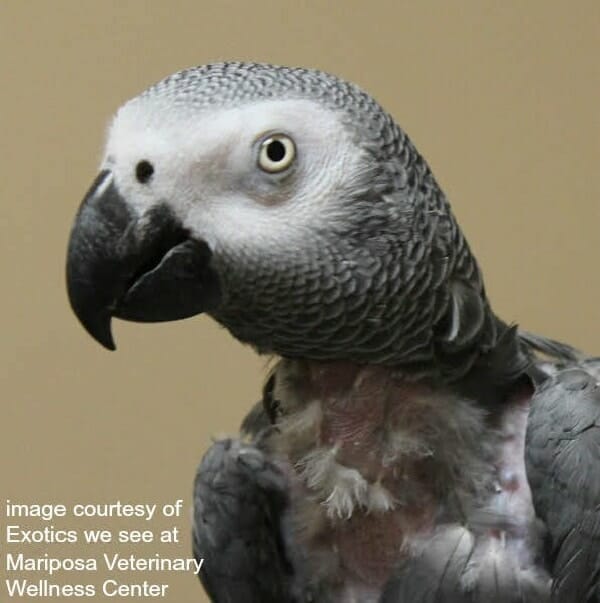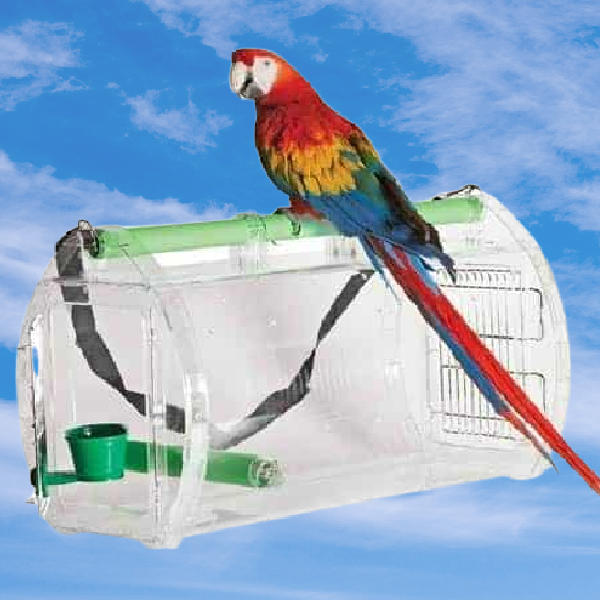Last Updated on by Mitch Rezman
A woman replying in a Facebook thread about her self-mutilating parrot “My vet said that it’s become a habit that’s it very hard to break”.
My response was “Ask your vet why these habits don’t develop in the wild”?
Another woman had spent $4000 between veterinarian bills and behaviorists. Her bird was still plucking. In the thread that evolved it turns out that her cages were filled primarily with eucalyptus perches.
Although eucalyptus can be safe it also has a great many toxins that can be lethal to a bird. She also related that her bird got about one hour of daylight – none of this came up in the conversation with her veterinarian or behaviorist.
Other threads relate to how the veterinarian had injected the bird with who knows what? One woman was going to try to serve her bird every spice known to mankind.
When you connect the dots you have to ask yourself if veterinarians could cure feather mutilation with some injections or humans could stop the bird from plucking by changing their diet, why have we not seen a cure for plucking?
Shameless self-promotion here. Windy City Parrot is the only site on the Internet that actually has a category devoted specifically to tools to help plucking and screaming birds that you can find here.
Both of the veterinarians and the bird companions talk about nothing but treatment and yet we hear no discussion about plucking triggers. I’ve compiled a shortlist to begin to steer you in the right direction.
If you have a plucking bird who will like some help I’d be happy to.
When I won’t respond to it “my bird is plucking please help!” That tells me nothing.
What I need to know and have you look at are the 10 feather plucking triggers I’ve listed below.
Some may even create an Ah-Ha moment for you.
10 Feather Plucking Triggers
- Nutrition (based diet) – are we looking at the possibility of food allergies? Are we eating too many seeds?
- Nutrition (chops) do we know the actual nutritional value of the chops we are making? Store-bought fruit has much more sugar than fruit eaten in the wild. Are we serving our birds citrus fruit like oranges and pineapples that sit in their crop for up to six hours possibly causing heartburn? Is your bird getting enough protein – what is the nutritional analysis of your chop?
- Habitat (cage) – does the birdcage offer a private area? Are there foraging/enrichment opportunities in and atop the cage? Is the bird sleeping on a soft rope perch or are his or her feet being irritated by sleeping on the wrong kind of perch?
- Habitat (home) does your bird have a place to be with you within the home so he or she is not eating furniture? Do you have enrichment and foraging activities outside of the cage? Do you burn candles or use air fresheners?
- Habitat (lighting) is your bird getting 12 hours of light and 12 hours of darkness or are you relying on North American ever-changing light cycles to thoroughly confuse and cripple your bird’s circadian clock?
- Habitat (change) – are we rearranging our bird’s cage at least every 30 days causing them to rethink their entire environment and distracting them from things like plucking their own feathers?
- Habitat (flock) – What is the interpersonal relationships between your bird and other members of the family including other pets?
- Bird (interpersonal) – is there an issue between your bird and other human flock members? Did you recently move a piece of furniture or picture on the wall (yes that can be a plucking trigger? Any issues with other animals in the home?
- Bird (physiological) – Is your bird clipped meaning it has at least 16 of its biggest feathers with rough edges that need to be fixed (preened – leading to plucking)? It no longer has a strong sense of balance – which is stressful
- Clean – are we exposing our birds to any sort of bathing and/or misting to enable adding hydration to their fathers? Is there a humidifier in the home? Are you using the wrong cleaning products like Lysol (recommended by a bird “expert” on YouTube)?
Written by Mitch Rezman
Approved by Catherine Tobsing
Your Zygodactyl Footnote
Author Profile
Latest entries
 Feeding Exotic BirdsDecember 29, 2025How to Switch or Convert Your Bird From Seeds to Pellets: Real-Life Case Studies and Practical Guidance
Feeding Exotic BirdsDecember 29, 2025How to Switch or Convert Your Bird From Seeds to Pellets: Real-Life Case Studies and Practical Guidance Feeding Exotic BirdsDecember 16, 2025A Practical, Budget-Smart Guide to Feeding Birds Well
Feeding Exotic BirdsDecember 16, 2025A Practical, Budget-Smart Guide to Feeding Birds Well Bird EnviornmentsDecember 7, 2025Understanding Budgie Cage Bar Orientation: Myths, Realities & Practical Solutions for Vertical-Bar Bird Cages
Bird EnviornmentsDecember 7, 2025Understanding Budgie Cage Bar Orientation: Myths, Realities & Practical Solutions for Vertical-Bar Bird Cages Feeding Exotic BirdsDecember 5, 2025How Dr. T.J. Lafeber Rewrote the Future of Pet Bird Nutrition
Feeding Exotic BirdsDecember 5, 2025How Dr. T.J. Lafeber Rewrote the Future of Pet Bird Nutrition




Yana Bolshem
22 Jan 2017https://uploads.disquscdn.com/images/2ce2c71dbd388376a5b435706010a8ba17c1f2529d4b9273376ca284205b22bd.png Thanks Mitch… well said. I have 2 parrots, one plucks the other doesn’t… 2 different species , 2 completely different personalities with different needs and wants… even though both have the same routine, similar toys, eat same types of food, same foraging toys, same human interaction… But.. one is attached to me to the point of me understanding her calling for me… when I work more than 3 days straight… there will be no feathers left… no matter how much time and attention the rest of her usual “flock” gives her. She was my first bird ever, I created my own “monster”, take full responsibility for her plucking behavior, tried many different “remedies”… just to come to one conclusion… my bird is my bird, and I don’t love her any less whether she has feathers or not!
WindyCityParrot
23 Jan 2017hey there pretty bird
Dianne Yonan
22 Jan 2017So it’s not good to give citrus fruits? Never heard that.
naw
23 Jan 2017For two reasons:
1. Because vitamin C facilitates iron absorption, excess vitamin C can lead to iron storage disease if your bird is on a fortified diet like pellets. (There are directions suggesting against feeding citrus fruits on every bag of Harrison’s.)
2. Like tomatoes, they can lead to a buildup of irritating acid in the crop, which causes the bird to pluck to try to alleviate its “heartburn”.
WindyCityParrot
23 Jan 2017thank you for that naw
Dianne Yonan
25 Jan 2017Yes thanks for the info. Luckily, I don’t feed citrus very often, but will not in future.
smchapman2
13 Mar 2017Blueberry loves cantelope juice and seeds. He also eats watermelon, grapes, fresh or cooked vegetables, particularly peas, eats beef and chicken, and fresh bread. Basically whatever I eat or drink. he has free flight, taks a bath under the tap, then flies to a parchment perch in a bright sunny window. Or if it’s cold, a heat light facing his tree in his playpen.
Catherine Tobsing
13 Mar 2017Blueberry sounds like one lucky bird:-)
smchapman2
13 Mar 2017He is truly a tiny person with feathers who understands many words. He’s the man of the house. I’m blessed to have him.
WindyCityParrot
13 Mar 2017they truly enrich our lives
Heather Smillie Aycan
24 Jan 2017Cigarette smoke can be bad too….right? What about a clean cage and the possibility of mites?
Melissa Lee
24 Jan 2017I notice that birds often reflect the unresolved issues of the owners
naw
2 Feb 2017Like children do of their parents.